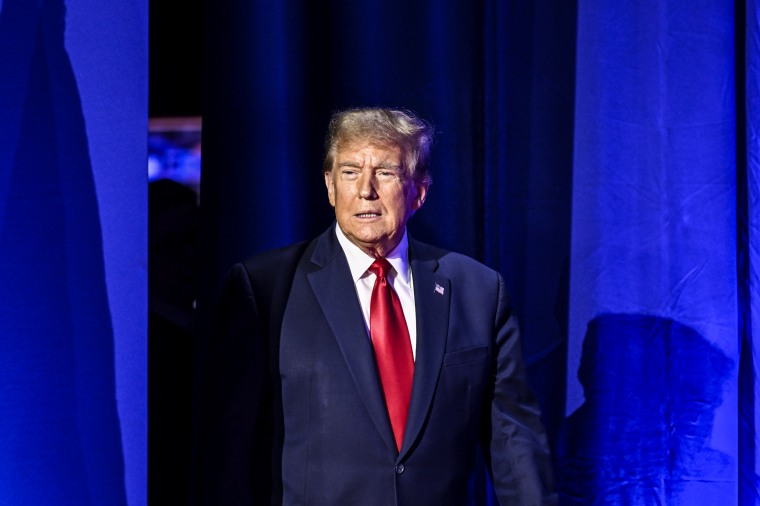WASHINGTON — The Supreme Court on Wednesday laid out a hearing schedule on former President Donald Trump's claims of presidential immunity that raises significant doubts that the election interference case against him will go to trial before the 2024 election — a major win for Trump in his effort to stave off legal consequences for his efforts to overturn his 2020 election loss.
The Supreme Court's decision to hear oral arguments the week of April 22 about whether Trump is entitled to presidential immunity left open a startling possibility: that a former president charged with conspiring to obstruct Congress and disfranchise millions of Americans in an effort to stay in the Oval Office after having lost an election may avoid facing trial before he is given a chance to return to the White House.
Until Wednesday evening, there had been a chance that Trump's trial in Washington — based on an indictment returned in August — could go to trial as soon as May, with a likely verdict potentially handed down months before Election Day 2024.
U.S. District Judge Tanya Chutkan had originally set a trial date for March 4, saying she would give Trump's team seven months to prepare for trial. But that timeline was delayed when the case was frozen in December following an appeal from Trump's team. Trump had 88 days left on that preparation timeline, which meant that had the Supreme Court simply allowed an appeals court’s decision on presidential immunity to stand, the case would have been underway in Chutkan's courtroom as soon as early May.
The Supreme Court's decision to hear arguments in April instantaneously erased the possibility that Trump would be convicted before the Republican National Convention, which is set to take place in Milwaukee in mid-July.
Prosecutors for special counsel Jack Smith previously estimated they'd need "no longer than four to six weeks” to present their case, while potential jurors received letters saying the trial "may last approximately three months after jury selection is completed."
The court could rule before the end of June, but it would depend in part on whether the nine justices are unanimous. It typically takes longer for the court to resolve cases when they are divided, with justices writing separate dissents.
Even if the court rules in June, the timeline is very tight to get the case started before Election Day.
"You're talking about a time frame in which you're really pushing up against the general election," Andrew Weissmann, an MSNBC legal analyst who was on former special counsel Robert Mueller's team, said Wednesday on "The Beat with Ari Melber."
Weissmann said the Supreme Court decision left him "extremely concerned" that there wouldn’t be a verdict in the Jan. 6 case before the general election, saying the new time frame was “a huge win” for Trump.
Neal Katyal, the former acting U.S. solicitor general, said that he was also very concerned about the timeline but that the Supreme Court could expedite things.
"The Supreme Court does hold most of the cards here,” Katyal said. "If they want to have this trial happen, they can certainly do it. They can hear the case on April 22, decide the case very quickly thereafter and allow Judge Chutkan the ability to start her trial."
The Supreme Court hearing will be held the week after the justices consider another case of relevance to Trump concerning one of the hundreds of people charged with offenses relating to the riot at the U.S. Capitol on Jan. 6, 2021.
Defendant Joseph Fischer is seeking to dismiss a charge accusing him of obstructing an official proceeding. Trump is charged with the same offense, and his lawyers mentioned Fischer's case in urging the justices not to rush his case to trial.
Trump's lawyers wrote in court papers that it "makes no sense to conduct a complex criminal trial while a case is pending in this court that might invalidate half the charges in the indictment."
Trump pleaded not guilty to that charge, as well as the three others he faces in the election interference case.
Hours before the Supreme Court announced the April hearing, Chutkan was in her courtroom for a hearing for one of Trump's fellow Jan. 6 defendants: Michael Foy, who assaulted officers with a hockey stick and a sharpened metal pole on Jan. 6.
At Foy's sentencing hearing, his attorney discussed the role of general deterrence in determining the length of his prison sentence, arguing that a sentence for a random rioter wouldn’t have that much of a deterrent effect for the public when the presumptive Republican nominee continues to spread his lies about the 2020 election.
“I’m not getting into that,” Chutkan said with a smile, prompting laughter in the courtroom.
CORRECTION (Feb. 28, 2024, 10:15 p.m. ET): A previous version of this article misspelled a former prosecutor’s last name. He is Andrew Weissmann, not Weissman.


